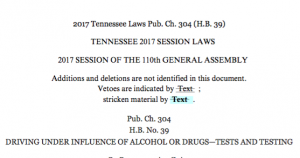 This is the second in a series of blog posts about recent changes to Tennessee’s Implied Consent Law. If you missed Part 1, you may read it here: “To Blow or Not to Blow: Tennessee’s 2017 Implied Consent Law – Part 1.”
This is the second in a series of blog posts about recent changes to Tennessee’s Implied Consent Law. If you missed Part 1, you may read it here: “To Blow or Not to Blow: Tennessee’s 2017 Implied Consent Law – Part 1.”
As discussed in Part 1, effective July 1, 2017, Tennessee made sweeping changes to its Implied Consent Law in an apparent attempt to comply with the recent U.S. Supreme Court decision, Birchfield v. North Dakota, 136 S.Ct. 2160 (2016). The decision to administer a breath test (as opposed to a blood test) is discretionary if it is administered pursuant to: (1) implied consent; (2) actual consent; (3) pursuant to a search warrant, absent consent; (4) incident to a lawful arrest; or (5) when the breath test is mandatory, as discussed in Part 1 of this series.
The language “incident to a lawful arrest” is directly from the Birchfield opinion, which held that a breath test (unlike a blood test) is a search that always falls within the “search incident to a lawful arrest” exception to the search warrant requirement. Although the Constitution protects against searches and seizures without a warrant establishing probable cause for that search, an exception has been carved out for the category of searches that are “incident to a lawful arrest.” These are searches of minimal intrusion that a suspect has no constitutional right to refuse.
In Tennessee, if an officer decides to administer a breath test, the officer must, prior to conducting the test, inform the suspect that refusing the take the breath test will result in the suspension of the suspect’s driver license and may result in a requirement for an ignition interlock device on the suspect’s vehicle. The statute explicitly clarifies that if the officer fails to advise the suspect of the consequences of refusing the breath test, those consequences cannot be imposed. If the suspect refuses to submit to the breath test, the officer cannot administer the breath test unless a search warrant or a court order is first obtained. This appears to contradict the earlier section of the statute that states that the breath test shall be administered in certain aggravated circumstances.
The provisions surrounding blood tests to determine the alcohol or drug content in a subject’s blood are significantly revised in the new version of the Implied Consent Law. Unlike the prior version of the law, and unlike breath tests, there are no mandatory circumstances in which an officer must administer a blood test. Rather, an officer may administer blood test only if one of three circumstances exist: (1) the suspect gives actual consent, (2) the officer obtains a search warrant, or (3) if exigent circumstances justify obtaining the blood sample without a warrant.
Also new to the revised version of this law is clarification of what is required for valid consent to a blood draw. The statute explicitly says that “implied” consent is insufficient for a blood draw; the suspect must give actual, informed consent for an officer to administer a blood test. Verbal consent to a blood draw is not sufficient; the suspect must actually sign a waiver form before the test is administered. This waiver form must be either given to the suspect to read or, if the suspect cannot read the waiver for any reason, it must be read aloud by the officer. Interestingly, the statute specifically says that there is no presumption that the suspect actually understood the waiver simply because the officer read it aloud. A defendant shall have the opportunity in court to present evidence that he or she did not understand the meaning or consequences of signing the form.
The procedures for actually obtaining the blood from a suspect remain relatively unchanged, except in one notable circumstance: if the suspect is unconscious. Previously, an officer could obtain a blood sample from an unconscious suspect, but the results were not admissible unless the suspect gave consent after-the-fact. Now, the statute specifically states that an unconscious suspect shall not be subjected to a blood test unless the officer obtains a search warrant or shows that exigent circumstances existed.
Stay tuned for further discussion of this new law in the near future.
About the Author: Steven Oberman has been licensed in Tennessee since 1980, and successfully defended over 2,500 DUI defendants. Among the many honors bestowed upon him, Steve served as Dean of the National College for DUI Defense, Inc. (NCDD) and currently serves as chair of the National Association of Criminal Defense Lawyers DUI Committee. Steve was the first lawyer in Tennessee to be Board Certified as a DUI Defense Specialist by the NCDD.
He is the author of DUI: The Crime & Consequences in Tennessee, updated annually since 1991 (Thomson-West), and co-author with Lawrence Taylor of the national treatise, Drunk Driving Defense, 7th edition (Wolters Kluwer/Aspen). Steve has served as an adjunct professor at the University of Tennessee Law School since 1993 and has received a number of prestigious awards for his faculty contributions. He is a popular international speaker, having spoken at legal seminars in 30 states, the District of Columbia and three foreign countries.
The author would like to thank his associate attorney, Anna Rickels, for her research and contributions to this article.
If you would like to contact the author, please visit: http://www.tndui.com

